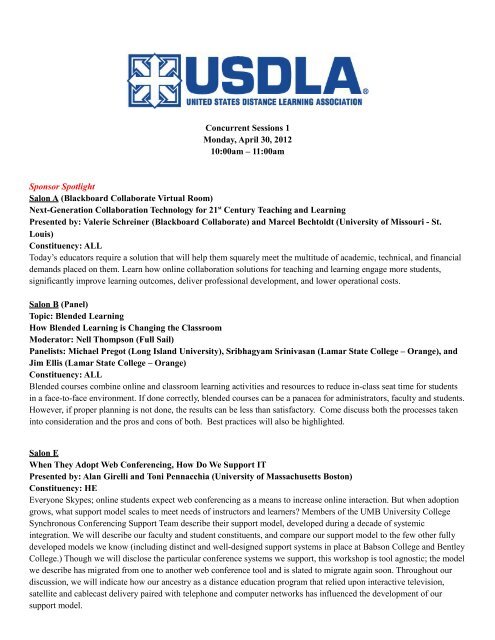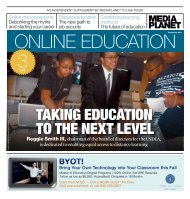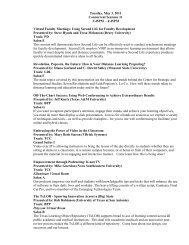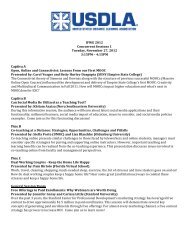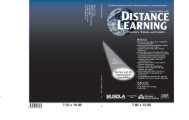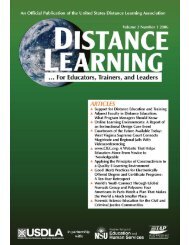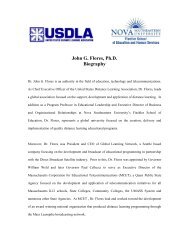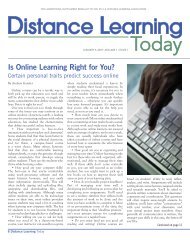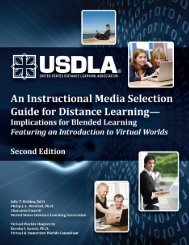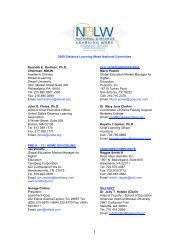Concurrent Sessions 1 Monday, April 30, 2012 10 - United States ...
Concurrent Sessions 1 Monday, April 30, 2012 10 - United States ...
Concurrent Sessions 1 Monday, April 30, 2012 10 - United States ...
Create successful ePaper yourself
Turn your PDF publications into a flip-book with our unique Google optimized e-Paper software.
<strong>Concurrent</strong> <strong>Sessions</strong> 1<br />
<strong>Monday</strong>, <strong>April</strong> <strong>30</strong>, <strong>2012</strong><br />
<strong>10</strong>:00am – 11:00am<br />
Sponsor Spotlight<br />
Salon A (Blackboard Collaborate Virtual Room)<br />
Next-Generation Collaboration Technology for 21 st Century Teaching and Learning<br />
Presented by: Valerie Schreiner (Blackboard Collaborate) and Marcel Bechtoldt (University of Missouri - St.<br />
Louis)<br />
Constituency: ALL<br />
Today’s educators require a solution that will help them squarely meet the multitude of academic, technical, and financial<br />
demands placed on them. Learn how online collaboration solutions for teaching and learning engage more students,<br />
significantly improve learning outcomes, deliver professional development, and lower operational costs.<br />
Salon B (Panel)<br />
Topic: Blended Learning<br />
How Blended Learning is Changing the Classroom<br />
Moderator: Nell Thompson (Full Sail)<br />
Panelists: Michael Pregot (Long Island University), Sribhagyam Srinivasan (Lamar State College – Orange), and<br />
Jim Ellis (Lamar State College – Orange)<br />
Constituency: ALL<br />
Blended courses combine online and classroom learning activities and resources to reduce in-class seat time for students<br />
in a face-to-face environment. If done correctly, blended courses can be a panacea for administrators, faculty and students.<br />
However, if proper planning is not done, the results can be less than satisfactory. Come discuss both the processes taken<br />
into consideration and the pros and cons of both. Best practices will also be highlighted.<br />
Salon E<br />
When They Adopt Web Conferencing, How Do We Support IT<br />
Presented by: Alan Girelli and Toni Pennacchia (University of Massachusetts Boston)<br />
Constituency: HE<br />
Everyone Skypes; online students expect web conferencing as a means to increase online interaction. But when adoption<br />
grows, what support model scales to meet needs of instructors and learners? Members of the UMB University College<br />
Synchronous Conferencing Support Team describe their support model, developed during a decade of systemic<br />
integration. We will describe our faculty and student constituents, and compare our support model to the few other fully<br />
developed models we know (including distinct and well-designed support systems in place at Babson College and Bentley<br />
College.) Though we will disclose the particular conference systems we support, this workshop is tool agnostic; the model<br />
we describe has migrated from one to another web conference tool and is slated to migrate again soon. Throughout our<br />
discussion, we will indicate how our ancestry as a distance education program that relied upon interactive television,<br />
satellite and cablecast delivery paired with telephone and computer networks has influenced the development of our<br />
support model.
Salon F<br />
From International to Global Education: Concept, Examples, and Implementation<br />
Presented by: Marc Sperber (Duke Global Health Institute)<br />
Constituency: HE/INT<br />
Global education transitions from the one-or two-way flow of knowledge between international partners or dispersed<br />
learners to a multi-nodal global network in which students around the world learn 21st century cross-cultural collaboration<br />
skills while they learn course content. Examples and steps to implement such a model will be shared.<br />
Grand Suites 1<br />
A Journey Into the Parallel Universe: Designing Online Simulations<br />
Presented by: Teri Portman and Pamela Bryan Williams (Webster University)<br />
Constituency: ALL<br />
The parallel universe describes the separate but equal nature of face-to-face and online courses. This presentation<br />
demonstrates how interactions conducted in face-to-face courses can be translated to an online environment, in order to<br />
provide a comparable, high quality learning experience for online students.<br />
Grand Suites 2<br />
Motivating Faculty to Teach Online through Community of Practice Model<br />
Presented by: Lujean Baab, Aaron Bond (IDDL-Virginia Tech)<br />
Constituency: HE/COR/TEL/GOV<br />
A recent survey of online education in the US revealed little change faculty acceptance of online learning in the past eight<br />
years. This session will present an overview of how faculty mentors in a Community of Practice model can motivate<br />
faculty involvement and overcome faculty resistance to teaching online.<br />
Sponsor Spotlight<br />
Broadway 1<br />
Cheating in Distance Education: Old Threats, New Threats, Effective Solutions<br />
Presented by: David Foster (Kryterion), Michelle Gutierrez (Western Governor’s University), Nancy Mattoon<br />
(Kryterion), and Rick Shearer (Penn State World Campus)<br />
Constituency: ALL<br />
The goal of the session is to help distance education organizations better prepare for the cheating threats we will see in our<br />
courses, and to manage those threats effectively. Secure testing in distance education has its obvious challenges. Recent<br />
reports indicate that cheating may be more widespread in distance education courses than in traditional education courses.<br />
During the session, traditional threats (such as copying from a friend), along with the most recent cheating technologies<br />
on the market, will be identified and discussed. Also, methods to handle the threats and reduce the risks associated with<br />
cheating will be discussed. Presenters include representatives from both corporate and academic worlds, with ample<br />
reference to real-life situations and solutions.<br />
Broadway 2<br />
MSBA Online: Improving Teaching and Learning When Budgets are Strained<br />
Presented by: Jeanie Gordon (Missouri Schools Boards’ Association), Monica Beglau (eMints National Center),<br />
and Michael Grissom (Missouri School Boards’ Association)<br />
Constituency: K-12/HE<br />
Bringing online learning from the margin to the mainstream is challenging when funding is limited. The Missouri School<br />
Boards' Association, MU College of Education and MOREnet formed a partnership, resulting in "MSBA Online" - a<br />
consortium designed to leverage resources among members and provide high quality learning in Missouri schools. This<br />
innovative approach has been the result of several months of discussion and thought by many stakeholders willing to<br />
bring their resources and expertise to the table for the good of all. Information will be shared during the presentation, and<br />
group activities will be incorporated to spur thought and reflection among attendees.
<strong>Concurrent</strong> <strong>Sessions</strong> 2<br />
<strong>Monday</strong>, <strong>April</strong> <strong>30</strong>, <strong>2012</strong><br />
11:15am – 12:15pm<br />
Salon A (Blackboard Collaborate Virtual Room)<br />
The Phoenix Way– Engaging Students Through Immersive Experiential Learning<br />
Presented by: Douglas Beckwith (Toolwire), David Jame Clarke IV, Cecilia Gregg, and Yvonne Phelps (University<br />
of Phoenix)<br />
Constituency: HE<br />
Higher Education institutions today have a tremendous opportunity to engage and retain more students in their first year<br />
of study through the use of innovative online experiential learning environments that can be accessed by students anytime,<br />
anywhere. Learn how the University of Phoenix is spearheading innovation in this exciting field.<br />
Salon B (Panel)<br />
Topic: Instructional Design<br />
Instructional Design: The Secret Weapon of Successful Online Learning<br />
Moderator: Natalie Skadra (Cengage)<br />
Panelists: Deborah Adelman (Kaplan University), Debbie Nogueras (Northern Arizona School of Nursing), Dirk<br />
Davis (California Baptist University), and Elizabeth Morris (California Baptist University)<br />
Constituency: ALL<br />
Online education has become an accepted form of course content presentation, with hybrid and fully online programs at<br />
the forefront. Moving beyond the traditional online format to provide meaningful courses with an underlying<br />
constructivist framework and the development and interrelatedness of the instructional design, from institutional to course<br />
level, is the focus of this session.<br />
Salon E<br />
Adaptive Mobile Learning (AMOL): Educating the Generation Y<br />
Presented by: Nishikant Sonwalkar (Synaptic Global Learning)<br />
Constituency: ALL<br />
The next generation of the Adaptive Mobile Learning (AMOL) that supports classroom and online instruction on mobile<br />
devices (iPad1/2, Android Tablets) with incredible success by increasing student online course completion rates is being<br />
adopted by national and international K-12 and university practitioners. AMOL – 4DL HITE Technology moves away<br />
from the one-size-fits-all online LMS platforms and provides instructional content that responds to users’ learning<br />
preferences in real time. Educational programs that have used AMOL – 4DL HITE demonstrate the highest rate of course<br />
completion in M-learning (90-95%). Dr. Sonwalkar will present the Adaptive Mobile Learning interface and its<br />
application in the M-learning courses for generation-Y students across US.<br />
Salon F<br />
Technologies and Techniques for the Busy Online Teacher
Presented by: Darcy Christianson (University of Phoenix)<br />
Constituency: K-12/HE<br />
This presentation discusses technologies and techniques for the busy online educator. The presentation provides<br />
demonstrations of some lesser-known computer and common program shortcuts, reviews useful software to consider, and<br />
shares example approaches of some fun, clever techniques to help keep the online educator efficient as well as effective.<br />
Salon G<br />
The Development and Impact of a Virtual Writing Lab<br />
Presented by: Carl Hoagland, William Klein, and Christopher Schott (University of Missouri – St. Louis)<br />
Constituency: HE<br />
Multi-user virtual environments (MUVE) are increasingly examined for their educational effectiveness. Recently, the<br />
University of Missouri—St.Louis (UMSL) opened its Second Life Writing Center (SLWC), a venue where university<br />
students receive guidance with their writing. This presentation will describe the development, implementation and initial<br />
research about the Center.<br />
Grand Suites 1<br />
Beyond Google and Bing: Mining the Internet<br />
Presented by: Carrie Levin and Ray Schroeder (University of Illinois Springfield)<br />
Constituency: ALL<br />
Google and Bing dominate the search engine marketplace, but they are not the only – and in some cases not the best –<br />
research tools available. We will examine the range of Internet search tools that are available with an emphasis on those<br />
that will best serve those in education.<br />
Grand Suites 2<br />
Desktop Video Conferencing Success Stories in K–12 Education<br />
Presented by: Linda Dickeson (Lincoln Public Schools)<br />
Constituency: K-12<br />
In early 2011, Lincoln Public Schools implemented the infrastructure to support video conferencing on the desktop, first<br />
with laptops and then adding mobile devices. See what surprising successful uses have evolved that support teaching,<br />
learning and professional growth, and how the district will realize significant savings in time and mileage.<br />
Broadway 1<br />
Strategic Planning for Distance Learning in the Department of Defense<br />
Presented by: David Magill (Naval War College)<br />
Constituency: HE/COR/GOV/MIL<br />
In 1999, the Department of Defense released its strategic plan for distance learning initiatives within the department.<br />
Authorized by Congress, this was an ongoing collaborative effort between Defense, other Federal agencies, and private<br />
industry. This presentation assesses results achieved and considers the future of DL in DoD.<br />
Broadway 2<br />
Teaching Ethics Online, Ethically<br />
Presented by: Lynn Akin (Texas Woman’s University)<br />
Constituency: K-12/HE/COR/GOV<br />
Current media scrutiny of ethics and ethical transgressions is mainstream and intensive. Teaching ethics online provides a<br />
foundation for process and practice. Session participants will define ethics, identify best practices in teaching ethics<br />
online, review relevant teaching methods such as blogs and e-debates, and choose effective online assessments.
<strong>Concurrent</strong> <strong>Sessions</strong> 3<br />
<strong>Monday</strong>, <strong>April</strong> <strong>30</strong>, <strong>2012</strong><br />
2:00pm – 3:00pm<br />
Salon A (Blackboard Collaborate Virtual Room)<br />
Expanding the Usage of Mobile Devices to Improve Corporate Learning<br />
Presented by: Marty Newey (Allen Communication)<br />
Constituency: HE/COR/GOV/MIL/TEL<br />
As new learning technology emerges, there are always questions about how it can be utilized by corporations to improve<br />
operations, disseminate information, and to train employees. We will discuss how recent instructional design strategies<br />
incorporate mobile learning’s unique capabilities and how these strategies can help the participant’s future training efforts.<br />
Salon B (Panel)<br />
Google . . . It’s Not The Only Search Engine in Town<br />
TOPIC: Effective Searching<br />
Moderator: Steve Kerby (McDaniel College)<br />
Panelists: Nishikant Sonwalkar (Synaptic Global Learning) and Johnette Moody (Arkansas Tech University)<br />
Constituency: All<br />
Most students and educators are "Googleites" and they think that Google is the only search engine in town. Users need to<br />
become smart searchers by becoming aware of the many and varied search engines available. Panelists will touch on<br />
some interesting facts about Google and then look at search engines that many are probably unfamiliar with, touching<br />
upon general to specific search engines. Participants will be introduced to topics and search engines designed specifically<br />
for the topic. Panelists highlight best practices and emphasize that smart searching is the key to successful searching and<br />
successful completion of any Internet assignment.<br />
Sponsor Spotlight<br />
Salon E<br />
Designing for Quality in K-20 Online/Blended Learning<br />
Presented by: Todd Hitchcock (Pearson) and Mickey Revenaugh (Connections Learning)<br />
Constituency: K-12/HE<br />
As K-20 institutions increasingly turn to online/blended learning for direct impact on college readiness and success –<br />
through secondary school college prep, high school-college bridge programs, and skill development for college entrants,<br />
among others – hear how the field’s leaders are designing such programs for maximum quality and student benefit.<br />
Salon F<br />
Hit the Ground Running: Long-Term Learning with Handheld Devices<br />
Presented by: Sara Tarr (4D Metrics, Inc.)<br />
Constituency: COR/GOV/MIL/TEL/INT<br />
After attending a workshop or completing a course, the learner has short-term memory of the concepts or procedures<br />
presented. To maximize the learning transfer, the learning experience should contain opportunities for continued
interaction. Handheld devices are excellent tools for delivering and sending instances of instruction, assessment, and<br />
mentoring. Come join us to learn more!<br />
Salon G<br />
Strategies for Student-Instructor Dialogue that Increases Online Connection and Autonomy<br />
Presented by: Marina Kostina (Argosy University/Kendall College)<br />
Constituency: K-12/HE/COR/INT<br />
The goal of this presentation is to demonstrate three dimensions of student-instructor dialogue essential for a DL course<br />
that involve communication, interrelation, and a transcendence of cyberspace. It will also provide hands-on strategies for<br />
creating effective student-instructor dialogue that increases connection, boosts autonomy, and minimizes isolation online.<br />
Sponsor Spotlight<br />
Grand Suites 1<br />
Ensuring Academic Integrity in Online Exams<br />
Presented by: Jarrod Morgan (ProctorU)<br />
Constituency: All<br />
The presentation will demonstrate how educators can prevent cheating and ensure the academic integrity of online<br />
programs. The session will discuss how educators can advance policies designed to reduce incidents of dishonesty online<br />
using a number of strategies. The presenter will also share industry research and best practices.<br />
Sponsor Spotlight<br />
Broadway 1<br />
It's Like Baking a Chocolate Cake: Standardizing Your Development<br />
Presented by: Erin Doppke (Cengage Learning)<br />
Constituency: HE<br />
You wouldn't bake a chocolate cake using different measurements, different ingredients, and different temperatures each<br />
time. So why approach design that way? In this session, you will explore the benefits of standardization--identifying your<br />
organization's recipe for tasty instructional design.<br />
Broadway 2<br />
Online Learning with Technology: Is There a Faculty Disconnect?<br />
Presented by: Lori Kupczynski and Mary Beth Green (Texas A&M University – Kingsville)<br />
Constituency: ALL<br />
As online education continues to expand with over 19.1 million students today taking at least one online class, continued<br />
research into success in this medium is necessary. Faculty were surveyed about personal use of technology, professional<br />
use of LMS tools and attitudes. Results and implications will be presented.
<strong>Concurrent</strong> <strong>Sessions</strong> 4<br />
<strong>Monday</strong>, <strong>April</strong> <strong>30</strong>, <strong>2012</strong><br />
3:15pm – 4:15pm<br />
Sponsor Spotlight<br />
Salon A (Blackboard Collaborate Virtual Room)<br />
Trust but Verify: Ensuring Positive Student Experiences through Quality Assurance<br />
Presented by: Pam Birtolo, Teresa King, and Kim Rugh (Florida Virtual School)<br />
Constituency: K-12/HE<br />
What are the expectations you have for your organization? How do you verify that your instructors are meeting those<br />
expectations? In this session, two members of Florida Virtual School’s Instructional Quality Assurance team will provide<br />
an overview of innovative best practices in ensuring the quality of your students’ experience.<br />
Sponsor Spotlight<br />
Salon B (Panel)<br />
Topic: Mobile Learning<br />
Mobile Content, Mobile Applications, and Mobile Learning<br />
Moderator: Rhonda Blackburn (Desire2Learn)<br />
Panelists: Clair Schneeberger (Monarch Media) and Rob Reynolds (MBS Direct)<br />
Constituency: ALL<br />
Mobile devices represent a new technology frontier for delivering training and education content anywhere, anytime. This<br />
panel will provide research and case studies that show you how to leverage smart phones and tablets as learning tools and<br />
address the challenges and opportunities associated with building out a strategic mobile learning plan that embrace both<br />
content – commercial and open – and application. We will explore evolving technologies, best practices in content<br />
management, and useful mobile learning applications.<br />
Salon E<br />
Road to Success: Instructional Design Theory and Online Preparation Courses<br />
Presented by: Loren Kleinman (Berkeley College Online)<br />
Constituency: ALL<br />
Instructional design theory offers guidance on how to help people learn/develop. Using Berkeley College’s Road to<br />
Success in Online Learning as a case study, this session will explore methods of instructional design to develop online<br />
preparation courses that evaluate students’ cognitive/social capabilities in an online learning environment within an LMS.<br />
Sponsor Spotlight<br />
Salon G<br />
Strengthening the Legitimacy of Online Degrees Using Remote Proctoring Technology<br />
Presented by: Douglas Winneg (Software Secure)<br />
Constituency: K-12/HE/COR
As the number of students enrolled in online degree programs continue to grow, the institutions that provide them, as well<br />
as employers are now facing an integrity challenge with an important question: Does the online degree carry the same<br />
value in the market place? Securing the testing environment is a critical component for strengthening a student’s future<br />
academic credentials. How can this be achieved? We will explore the various authentication approaches and security<br />
requirements (K-12 Virtual School) and (Higher Ed Institution) and discuss why various organizations ultimately chose to<br />
require its students to use a Remote Proctoring solution, instead of going to campus, traveling to testing centers, or relying<br />
on usernames and passwords.<br />
Grand Suites 1<br />
Distance Learning Experiences of In-Service Music Teachers in a Master’s Program<br />
Presented by: Juan Vega (Boston University)<br />
Constituency: K-12/HE/GOV/INT<br />
The current study reports the experiences of in-service music teachers in a distance-learning master's program. The search<br />
focused on the motivational factors that led to the choice of a distance-learning program; benefits to the music education<br />
profession; attitudes resulted from attending online courses; and challenges in completing the degree.<br />
Grand Suites 2<br />
Create Your Own Bloom's Digital Taxonomy Pyramid!<br />
Presented by: Samantha Penney (Indiana State University)<br />
Constituency: K-12/HE/COR/GOV/MIL<br />
The Bloom's Digital Taxonomy Pyramid, using Web 2.0 technology, was originally created by Samantha Penney. Many<br />
have featured it in presentations at various conferences. Samantha will provide some background information on the<br />
pyramid, show how this one can be used, and walk you through how to create your own.<br />
Broadway 1<br />
Exploring Students’ Emotional Experiences Within the Distance Learning Environment<br />
Presented by: Diann Cockerham (Calice & Cockerham Consulting)<br />
Constituency: HE<br />
This presentation is designed to share findings from a recent study of the experiences of learners enrolled in post<br />
secondary distance learning courses. The research was guided by questions that facilitated exploration of the influence of<br />
emotional and social climates on the learners’ experience in this evolving educational environment. Come learn more!<br />
Broadway 2<br />
The State of Synchronous Teaching Technologies in Online Courses<br />
Presented by: Robert Zotti (Stevens Institute of Technology)<br />
Constituency: K-12/HE/GOV/MIL/INT<br />
This presentation will review the current state of research relating to the use of synchronous teaching/learning<br />
technologies in online courses - particularly web conferencing. Web conferencing systems have been commercially<br />
available for over <strong>10</strong> years, yet their adoption in online courses has been less than what might be expected.
<strong>Concurrent</strong> <strong>Sessions</strong> 5<br />
Tuesday May 1, <strong>2012</strong><br />
9:00am – <strong>10</strong>:00am<br />
Sponsor Spotlight<br />
Salon A (Blackboard Collaborate Virtual Room)<br />
USDLA Quality Standards: Pathway to Excellence, Leadership, and Best Practices<br />
Presented by: George Collins (LEARNTECH CORP.), Jan McMahill (Drake University), and Felicia Ryerson<br />
(Florida Virtual School)<br />
Constituency: ALL<br />
This engaging presentation highlights the importance of USDLA's Quality Standards Certification for those providers<br />
seeking to achieve true excellence in their distance learning programs. The certification process is first described and then<br />
a successful applicant will outline how they prepared for and benefited from the review.<br />
Salon B (Panel)<br />
Blended Learning Around the World<br />
Topic: Blended Learning<br />
Moderator: Aaron Bond (Virginia Tech)<br />
Panelists: Tara Lidstone (Vermont Interactive Television), Faye Tolar (Vermont Technical College), and Gene<br />
Eidelman (Mosaica Education)<br />
Constituency: K-12/HE<br />
This session will focus on the growth of online and blended learning at the K-12 and collegiate levels. Learn and discuss<br />
about the challenges, opportunities and best practices for expansion of online and blended programs globally, and how<br />
American organizations can lead in this arena.<br />
Sponsor Spotlight<br />
Salon E<br />
Diffusion of Innovations: Can Faculty Champions Become a Virtual Lab?<br />
Presented by: Judith Slapak-Barski and Lili Steiner (Nova Southeastern University)<br />
Constituency: K-12/HE/COR/INT<br />
Selected faculty served as media-enrichment Champions to act as change agents to improve distance education and<br />
promote faculty collaboration and higher engagement. Media-enrichment Champions literally became the virtual lab at<br />
Fischler School of Education (FSE), Nova Southeastern University, and enriched distance learning while generating a<br />
positive change in academic culture. The scope of this presentation will encompass the analysis, design and<br />
implementation of a Virtual Lab for faculty collaboration on course media enrichment, created on the principles of Everett<br />
Roger’s diffusion of innovation model. Please join us to learn more!<br />
Salon F<br />
Quality Improvement in e-Learning: The EFMD-CEL Approach
Presented by: Stella Porto (UMUC) and Christoph Meier (Institut für Wirtschaftspädagogik, Universität<br />
St.Gallen)<br />
Constituency: HE/COR/INT<br />
Quality management in education has moved from margin to mainstream. Authentic methods of quality assurance are a<br />
focus of institutions offering online programs. This presentation discusses the European Foundation for Management<br />
Development certificate for teChnology-Enhanced Learning (EFMD-CEL) aimed at continual improvement of<br />
educational programs that include a significant e-learning component.<br />
Salon G<br />
Harnessing the Power of an LMS to Improve Student Outcomes<br />
Presented by: Shawntel Landry and Alan Sloan (American College of Education)<br />
Constituency: HE<br />
This session focuses on ways an institution of higher learning can harness the power of a learning management system<br />
(LMS) to align curriculum to assessment and to generate a storehouse of assessment data that can be used to demonstrate<br />
mastery of student learning outcomes and to inform continuous improvement.<br />
Grand Suites 1<br />
A Mobile Kit for Lightweight Capture and Conferencing<br />
Presented by: Duncan McBogg and Chris Evans (University of Colorado Boulder)<br />
Constituency: K-12/HE/TEL<br />
This session will detail the benefits and drawbacks associated with the implementation of highly mobile USB-based A/V<br />
capture devices intended to enhance the mobility, usability and quality of software-based lecture capture and web<br />
collaboration tools. For more information about the hardware design associated with this session, please visit:<br />
http://oit.colorado.edu/blogs/at/field-kit-capture-and-conferencing.<br />
Grand Suites 2<br />
Seamlessly Embedded: Mainstreaming Integrated Academic Support for Students and Faculty<br />
Presented by: Andie DiMarco (Berkeley College Online)<br />
Constituency: HE/COR/GOV<br />
As greater numbers of learners arrive at college in need of developmental support, our Academic Support Center uses a<br />
collaborative model that embeds staff in first-year online coursework, allowing authentically contextualized support<br />
services for both faculty and students, and bringing academic support services into the mainstream of the educational<br />
community. This session will provide participants the opportunity to interact and engage with a variety of embedded<br />
workshop content, and will offer a forum for brainstorming ways to adopt Berkeley College Online’s integrated support<br />
model for use in other schools and organizations.<br />
Broadway 1<br />
Best Practices in Distance Education through Differentiated Instruction<br />
Presented by: Jodie Winship (The University of West Alabama)<br />
Constituency: K-12/HE<br />
This study emphasizes the importance of developing online programs that are tailored to the individual needs of the<br />
student. It accentuates the need to correlate online pedagogy with the individual strengths of the student and the student's<br />
motivation for enrollment in an online program. Join us to learn more!<br />
Broadway 2<br />
Improving Courses Across an Online Program: A Design-Based Approach<br />
Presented by: Karen Swan, Leonard Bogle, and Scott Day (University of Illinois Springfield)<br />
Constituency: HE
This presentation will discuss how faculty in a fully online graduate program are improving their courses through a<br />
design-based approach consisting of an initial peer review based on the Quality Matters rubric, followed by ongoing<br />
implementation improvements based on student responses to the Community of Inquiry survey.
<strong>Concurrent</strong> <strong>Sessions</strong> 6<br />
Tuesday May 1, <strong>2012</strong><br />
<strong>10</strong>:15am – 11:15am<br />
Sponsor Spotlight<br />
Salon A (Blackboard Collaborate Virtual Room)<br />
Questions Around Migrating to a New LMS<br />
Presented by: Rhonda Blackburn (Desire2Learn) and Daryl Diamond (Broward County Public Schools)<br />
Constituency: K-12/HE<br />
How can you help the migration process? How can you leverage this migration as a benefit to course design? What are the<br />
best approaches to train faculty? These are the various questions that will be addressed in this session. Come explore the<br />
wonderful world of faculty development and technology.<br />
Sponsor Spotlight<br />
Salon B (Panel)<br />
Preserving Institutional Integrity in Distance Learning: The Legal Quagmire Over Copyright, Fair Use,<br />
Intellectual Property, Financial Fraud and Student Identity Verification<br />
Panelists: Linda A. Simunek, Tatjana L. Martinez, Marilyn Gardner (Nova Southeastern University, Abraham S.<br />
Fischler School of Education)<br />
Constituency: ALL<br />
The integrity of distance learning is in the national forefront as institutions struggle with legally defensible policies and<br />
procedures in copyright, fair use, intellectual property, financial fraud and student identity verification. Explore the<br />
recurring legal issues confronting faculty, administrators, and students from fraud rings to copyright infringements and<br />
better understand the proactive safeguards your institution should be harnessing to protect its integrity.<br />
Salon E<br />
Using Learner Readiness to Inform Student Services and Instructional Design<br />
Presented by: Donna Payne (Maryville University) and Mac Adkins (Smarter Measures)<br />
Constituency: HE<br />
Career Education Corporation conducted a research project to validate its usage of a nationally-normed online student<br />
readiness assessment to inform placement of students in appropriate delivery systems, student services, and guide<br />
instructional design processes. Results of the research will be presented and recommendations for improvements in<br />
practice will be discussed.<br />
Salon F<br />
e-Portfolios in an Online Master's Program: Student and Faculty Perspectives
Presented by: Michelle Simmons (San Jose State University), Beth Wrenn-Estes (San Jose State University), and<br />
Genna Buhr (Fondulac District Library)<br />
Constituency: HE<br />
Built on fifteen core competencies of our profession (our MLIS program learning outcomes), the SJSU SLIS e-Portfolio<br />
has been valuable for our students and transformative to our online master's program. We intend to share our curricular,<br />
technical, and administrative successes and challenges.<br />
Salon G<br />
Homebound, In-Treatment – and Online<br />
Presented by: Mickey Revenaugh (Connections Learning), Rhonda Rochon Cotton (Houston Independent School<br />
District), and T.J. McCray (Connections Learning)<br />
Constituency: K-12<br />
Every year, hundreds of Houston Independent School District students are sidelined by illness, accidents, and other<br />
conditions that make conventional schooling impossible. Meeting the needs of these students is a real challenge. Discover<br />
an online approach that harnesses technology to provide a comprehensive, compassionate 21st century homebound/intreatment<br />
program that works!<br />
Sponsor Spotlight<br />
Grand Suites 1<br />
BYOD - Mobile Video Applications Revolutionize Today’s Learning Environment<br />
Presented by: Marci Powell, Marty Sexton, and Elaine Shuck (Polycom)<br />
Constituency: K-12/HE<br />
The Bring Your Own Device movement introduces an exciting paradigm in face-to-face visual collaboration. In this mustattend<br />
session, mobility will be explored and school students will share how they are using video conferencing to facilitate<br />
small group discussions. BYOD, connect through your laptop or tablet, and experience video-enabled blended learning!<br />
Sponsor Spotlight<br />
Grand Suites 2<br />
Student Engagement: Providing Mobility to Non-Traditional Students<br />
Presented by: Doug Parrish (Blackboard)<br />
Constituency: HE<br />
During this insightful session, Doug Parrish, Vice President of Blackboard Notification Solutions will share with you his<br />
unique perspective on student engagement, how it relates to retention rates, distance learning, technology and how it<br />
impacts 2yr/4yr/private institutions.<br />
Broadway 1<br />
Constructive Heuristics as Candidate Best Practices for 21st Century Education<br />
Presented by: Albert DiCanzio (Webster University)<br />
Constituency: HE/COR/MIL/INT<br />
During this session, presenters will state the axioms, historical basis, and normative theory of education by constructive<br />
heuristics developed and tested in online teaching over the decade 2001-2011. Three best practices are introduced<br />
emanating from this theory, and discuss methods of assessment, deployment and verification.<br />
Broadway 2<br />
Making Virtual Field Schools a Reality<br />
Presented by: Patrick Smith, Robyn Herry, and Emin Saglamer (Texas State University-San Marcos)<br />
Constituency: K-12/HE/INT
Texas State University media specialists and instructional designers have collaborated with geographers and faculty to<br />
design and implement a virtual field school experience intended for use by university-level geography and secondary<br />
education students. We will share our design/development processes, as well as lessons learned in our endeavor.
<strong>Concurrent</strong> <strong>Sessions</strong> 7<br />
Tuesday May 1, <strong>2012</strong><br />
11:<strong>30</strong>am – 12:<strong>30</strong>pm<br />
Salon A (Blackboard Collaborate Virtual Room)<br />
The New Interactive Embedded Course Resource<br />
Presented by: Mary Jane Clerkin (Berkeley College)<br />
Constituency: HE<br />
Accessible from computers, laptops, and mobile devices such as the iPad, iPhone, Android, and Smartphones and<br />
available directly from within the course management system, the new embedded textbook allows online instructors to<br />
add rich learning materials into their embedded texts and allows students to engage and collaborate within the text. This<br />
presentation will show how an instructor has used this embedded course resource in an actual online course and how the<br />
instructor has added annotations, notes, bookmarks, discussions, videos and interactive links to enrich the text and to<br />
encourage the students, not only to read the text, but to engage and interact within it thus providing students with a robust<br />
online learning experience.<br />
Salon B (Panel)<br />
Topic: Quality Assurance<br />
Quality Assurance Process in Online Course Development & Innovations in Online Proctoring<br />
Moderator: Janet McMahill (Drake University)<br />
Panelists: Pei-Ju Liu (Central Michigan University) and Rick Beaudry (B Virtual, Inc.)<br />
Constituency: ALL<br />
Course design is the foundation that teaching and learning builds upon. Come learn how one institution implements a<br />
campus-wide quality assurance process before, during, and after online course development and revision, including<br />
curricular review, standard structure, 3-level quality reviews, pilot, and follow-up. In addition, a thought-provoking<br />
exploration into the people, process and technology innovations that are driving today’s live online proctoring services<br />
will also be surveyed. Learn how colleges and universities in North America are successfully transitioning to the arena of<br />
online exams and opening up their education course reach to students around the globe.<br />
Salon E<br />
Reputation and Image: Some Influences on Resource Environments<br />
Presented by: Steve Hoagland (Walden University)<br />
Constituency: HE/COR/GOV<br />
Institution reputation and image stimulate discussions and appeal to scholars and to practitioners. This session will portray<br />
a model and some evidence of linkages among delivery modalities and institutional stature. The need for resource<br />
diversity and institutional effectiveness are points of emphasis and practical value resides with three learning objectives.<br />
Come join us!<br />
Salon F<br />
Distance Learning at Wiley College, A Historically Black College
Presented by: Kim Long, Glenda Carter, and Nathaniel Hewitt (Wiley College)<br />
Constituency: HE<br />
This presentation will examine the Distance Learning program evolution and development at Wiley College, a historically<br />
Black College from the perspective of three common objectives: widening access to educational opportunity; enhancing<br />
the quality of learning; and reducing the cost of higher education for disadvantaged students.<br />
Salon G<br />
JKO: Global Delivery and Mobile Learning for Military Training<br />
Presented by: Joseph Camacho (Joint Staff J7 Joint and Coalition Warfighting)<br />
Constituency: GOV/MIL<br />
JKO is the distance learning training capability for Service men and women deploying to joint exercises and mission<br />
operations. The JKO Director will speak to the issues, challenges and significance of distance learning capability for<br />
military training; the evolution from introducing fundamental capability to immersive learning technologies and mobile<br />
delivery.<br />
Sponsor Spotlight<br />
Grand Suites 1<br />
How the ICCOC Uses Data Analytics to Increase Student Success<br />
Presented by: Steve Rheinschmidt (Iowa Community College Online Consortium) and Steve Ast (Pearson<br />
eCollege)<br />
Constituency: HE<br />
Connecting analytics to achievement has become a critical component of success, both for institutions and for students.<br />
This session will discuss how, with the right tools, technology and culture in place, institutions can use data analytics to<br />
increase student retention and success.<br />
Grand Suites 2<br />
LEAP OF FAITH: Trials and Tribulations after Converting to Moodle<br />
Presented by: Charlene Stubblefield, Stephanie Holmes, Major Stewart, and John Williams (Prairie View A&M<br />
University)<br />
Constituency: HE<br />
Prairie View A&M University took a great leap of faith switching to Moodle. There were great highs and deep lows but<br />
through it all we are closer to the promised-land. Learn what happened now that they have followed the yellow brick road<br />
to Moodle and are now back in Kansas.<br />
Broadway 1<br />
Online Teaching: Meeting the Needs of Faculty and Generational Learners<br />
Presented by: Mary Rose Grant (University of Missouri – St. Louis)<br />
Constituency: HE/COR<br />
This session describes a competency-based approach for online course and faculty development which expands the<br />
mastery of best practices and cuts across generational lines. Participants will explore the dynamics of web-based teaching<br />
and the roles and responsibilities of faculty in meeting the needs and expectations of new generations of e-learners.<br />
Broadway 2<br />
The Blended Advantage–Engaging & Effective Instruction for K-12 Learners<br />
Presented by: Paula Galland (Mercury Online Education)<br />
Constituency: K-12<br />
This session will demonstrate how an online charter school for students in kindergarten through 12th grade combines high<br />
quality online instruction with essential face-to-face learning. The model allows for students to work independently on<br />
learning paths identified that address individual student needs. Join us for this interesting discussion!
<strong>Concurrent</strong> <strong>Sessions</strong> 8<br />
Tuesday May 1, <strong>2012</strong><br />
2:15pm – 3:15pm<br />
Salon A (Blackboard Collaborate Virtual Room)<br />
Distance Learning – Its Role In Achieving Global Digital Solidarity<br />
Presented by: Daryl Diamond (Broward County Schools)<br />
Constituency: ALL<br />
Distance learning - catalyst closing the digital divide by giving access; encouraging digital inclusion through digital<br />
literacy and online content and services; ensuring underserved individuals' access to education and tools improving their<br />
lives. This session discusses 25 years of best practices and USDLA's role in future global digital solidarity projects.<br />
Salon B (Panel)<br />
Topic: Student Services<br />
Effective Services To Inspire Successful Students<br />
Moderator: Stella Porto (UMUC)<br />
Panelists: Elizabeth Hamtil (Webster University) , Kate Pitman (Webster University), and Tamela Crickenberger<br />
(Liberty University)<br />
Constituency: HE<br />
This panel discussion will describe advising and student service strategies and best practices for assisting and inspiring<br />
distance learning students towards excellence. Particular attention will be paid to technologies which can facilitate the<br />
timely communication of information to students.<br />
Salon E<br />
Supporting Field Experiences with Mobile Learning<br />
Presented by: Matthew Miller (University of Missouri)<br />
Constituency: HE<br />
An internship or field experience may be the first time students are learning at a distance from their institution, however<br />
unlike most online courses, learners need enhanced communication with instructors and they require flexible deadlines.<br />
Presenters will discuss teaching and supporting learners in Health Professions 4975, a required capstone course.<br />
Salon F<br />
Best Practices to Increase Your Online Enrollment<br />
Presented by: John Hall (Greenwood & Hall) and Eran Goren (US Interactive Media)<br />
Constituency: HE<br />
Is your institution positioned to take advantage of the demand for online programs? Join Greenwood & Hall and US<br />
Interactive Media in a discussion of the current online marketplace, best marketing and recruitment practices and required<br />
resources to build a cost-effective infrastructure to increase your online enrollments.
Salon G<br />
Professional Development for Preparing Online Faculty<br />
Presented by: Sue Bauer and Amy Sugar (University of Central Florida)<br />
Constituency: HE/COR<br />
This session explores the redesign process for the University of Central Florida’s award winning professional<br />
development course. This course gives faculty the technical and pedagogical foundation to develop/deliver effective<br />
online courses. The redesign process is a culmination of research and feedback from online faculty, administration,<br />
instructional designers, and other stakeholders.<br />
Sponsor Spotlight<br />
Grand Suites 1<br />
Closing the Instructor Readiness Gap in Online Learning<br />
Presented by: Cindy Lohan (Pearson Learning Solutions)<br />
Constituency: HE<br />
In this session, learn how institutions can bridge the gap between instructor readiness and the explosive growth in demand<br />
for online learning by adopting a formal certification and degree concentration program.<br />
Grand Suites 2<br />
Reinventing Electronic Field Trips<br />
Presented by: Douglas Shipman, Frances Burroughs, and Stacy Hasselbacher (Colonial Williamsburg Foundation)<br />
Constituency: K-12/HE<br />
The Colonial Williamsburg Electronic Field Trip series has provided cutting edge, USDLA-award winning interactive<br />
elementary/middle school distance learning for 16 years. With changing technology and audience needs, the Foundation is<br />
reviewing its program. Participants will learn about the program design, changing factors and participate in discussion of<br />
future strategies.<br />
Broadway 1<br />
Who Are Our Learners?<br />
Presented by: Renee Aitken (Northcentral University)<br />
Constituency: K-12/HE/GOV<br />
In this presentation, we will look at the characteristics assigned to adult learners and discuss why those 20 year old<br />
stereotypes may not be accurate, especially in an online environment. We will look at how stereotypes influence teaching,<br />
course design, grading, and the impact stereotyping students has had on regulations.
<strong>Concurrent</strong> <strong>Sessions</strong> 9<br />
Tuesday May 1, <strong>2012</strong><br />
3:<strong>30</strong>pm – 4:<strong>30</strong>pm<br />
Salon A (Blackboard Collaborate Virtual Room)<br />
Developing, Maintaining, and Growing a State Chapter<br />
Presenters: Ken Conn (USDLA), Darrell Naylor Johnson (GADLA), and Stella Porto (GADLA)<br />
Constituency: ALL<br />
As the title states, this session will focus on developing, maintaining, and growing a state chapter of the <strong>United</strong> <strong>States</strong><br />
Distance Learning Association. You will have the opportunity to learn with various state chapter leaders who will share<br />
their experiences and discuss the opportunities and challenges of developing and sustaining a state-wide organization that<br />
serves a broad constituency of distance learning professionals.<br />
Sponsor Spotlight<br />
Salon B (Panel)<br />
Topic: Adaptive Learning<br />
Adaptive Mobile Learning: Changing the Interface of Education<br />
Moderator: Nishikant Sonwalkar (Synaptic Global Learning)<br />
Panelists: Marci Powell (Polycom), Moustapha Diack (Southern University), Paul Jesukiewicz (Booz Allen<br />
Hamilton), Natalie Skadra (Cengage Learning), and Joseph Camacho (Joint Knowledge Online (JKO) and<br />
Regional Security Cooperation Network (RSCN))<br />
Constituency: ALL<br />
Despite the predictions and expectations that the online education will become a “Killer App” and with major impact on<br />
education, the first generation of online education has led to more disappointments than success stories. To improve<br />
current state-of-art and to increase effectiveness of the online education, the focus is now towards systems that can adapt<br />
the content to match the learning preference of the individual learners, termed as the adaptive learning systems. With<br />
increasing infusion of mobile devices, such as, iPhone, iPod, iPad, Android Tablets, now the adaptive mobile learning is<br />
becoming more and more possible with real-time interaction between students and faculty with integrated educational<br />
Apps. This indicates an unprecedented opportunity for adaptive mobile learning with integrated educational apps to<br />
dominate the future of M-learning. The panel of experts will discuss the challenges and opportunities that lie ahead for the<br />
proliferation of adaptive mobile learning.<br />
Salon E<br />
Beyond Facebook: Creating the NextGen Social Media Communities of the 21 st Century<br />
Presenters: James Samels (The Education Alliance), Jim Martin (Mount Ida College), John Hall (Greenwood &<br />
Hall), Todd Rickel (Herzing University Online), and Paul Stilmank (7Summits)<br />
Constituency: ALL<br />
During this session, presenters will provide a rare glimpse into the influence and growth of social media in higher<br />
education. The presentation will provide social media research tools and solutions to better manage, assess and leverage<br />
social media growth strategies in the higher ed marketplace. These practitioner-scholar panelists offer special insight into<br />
shaping social media branding, messages, and target audiences on a timely and profitable basis.
Salon F<br />
Implementing a Faculty Online Certification Program ...A Piece of Cake<br />
Presenter: Arletha McSwain (Norfolk State University)<br />
Constituency: HE<br />
Nationally, colleges and universities are reporting that faculty resistance is the most significant impediment to the growth<br />
of their online programs (Managing Online Education Survey, WICHE Cooperative Educational Telecommunications,<br />
20<strong>10</strong>). This session will present a faculty online certification program that can be easily replicated based on accrediting<br />
and compliance requirements.<br />
Salon G<br />
Onboard! Moving From Orienting to Us to Onboarding For You<br />
Presenters: Susan Bartel and Tina Ehrhardt (Stephens College)<br />
Constituency: HE/COR<br />
Student orientation programs are common but tend to focus on one way information. Onboarding is a concept embraced<br />
by organizations to orient and assimilate new employees. This presentation will showcase the success and mistakes of<br />
how one college took this concept and developed an onboarding program for distance learners.<br />
Grand Suites 2<br />
Annenberg Learner: 'New' Enhanced Video Streaming and Open Source Resources<br />
Presenters: Joanne Grason and John Kahler (Annenberg Learner)<br />
Constituency: ALL<br />
Annenberg Learner, an entity of The Annenberg Foundation, brings over <strong>30</strong> years of educational experience creating high<br />
quality video and related content for any classroom format. Our videos exemplify excellent teaching and support our<br />
mission of encouraging the development of more effective ways to share ideas and knowledge. Come join us and learn<br />
about the in-depth resources available on learner.org, allow us to demonstrate our new 'Enhanced Streaming' of the<br />
Annenberg Learner Collection, and view new video content.<br />
Broadway 1<br />
EconEdLive! Moving Past Econ: <strong>10</strong>1!<br />
Presented by: Barbara Flowers (Federal Reserve Bank of St. Louis)<br />
Constituency: K-12/HE<br />
A 2011 Award of Excellence winner from Tech & Learning Magazine, EconEdLive! presents students with new ways of<br />
learning difficult economic concepts, such as the time value of money and comparative advantage, as well as vital<br />
personal finance lessons, such as the effects of inflation and the importance of saving. Attendees will learn how to access<br />
all programs through a tour of the website (all of our programs are free of charge and available for download). In<br />
addition, attendees will view the Instructor Management Panel and receive instruction on how to register and manage a<br />
classroom, and sample a variety of programs for content and interactivity to determine where programs, podcasts, and/or<br />
chats will fit in their curriculum.<br />
Broadway 2<br />
MAP RN: A Novel Approach to Nursing Education Using Distance Technology<br />
Presenter: Jan Jones-Schenk (Western Governors University)<br />
Constituency: HE/COR/GOV/MIL/INT/TEL<br />
The MAP RN project was designed to address a growing need to add to the BSN prepared nursing workforce and to<br />
redesign traditional aspects of nursing education to increase the use of distance technology to increase access to<br />
prelicensure nursing education amongst primarily working adults and those in career transition. During this session, we<br />
will describe the MAP RN, project goals for developing a new BSN workforce, describe novel methods of using distance<br />
technology to redesign traditional components of nursing education and describe the clinical coaching and clinical<br />
intensive model used in a competency based BSN education program. Come join us for this fascinating discussion!
<strong>Concurrent</strong> <strong>Sessions</strong> <strong>10</strong><br />
Wednesday, May 2, 2011<br />
9:00am – <strong>10</strong>:00am<br />
Salon A (Blackboard Collaborate Virtual Room)<br />
Growth Just Doesn’t Happen, You Plan For It!<br />
Presented by: Richard Copeland and Amanda Williamson (Georgia Virtual School)<br />
Constituency: K-12<br />
Plan for Growth! Learn how Georgia Virtual School went from serving a couple hundred to 45,000 students by<br />
implementing online, blended and shared resources. See how using innovative instructional practices, organized data and<br />
a few creative ideas can ensure staying power and growing power to take your program to the next level.<br />
Salon E<br />
Creating a Statewide Education Network<br />
Presented by: James Hodges, Jeff Egly, and Louie Valles (Utah Education Network)<br />
Constituency: K-12/HE<br />
This session will focus on the Utah Education Network (UEN) and their implementation of cutting edge video<br />
technologies that have allowed them to increase collaboration in the classroom. Positive results include increases in<br />
number of high school graduates with college credits and a growing number of graduates with associate’s degrees.<br />
Salon F<br />
Is It Working? Measuring eLearning Outcomes<br />
Presented by: Claire Schneeberger (Monarch Media)<br />
Constituency: ALL<br />
Based on a case study, presenters will show you doable strategies for quantifying learning outcomes--including evidencebased<br />
data related to social learning, simulations, and video skills modeling. Participants will leave with examples that can<br />
help them with their own online training development and research efforts.<br />
Salon G<br />
Moving Intersubjectivity from Margin to Mainstream in Threaded Discussions<br />
Presented by: Barbara Hall (Ashford University)<br />
Constituency: HE<br />
A threaded discussion with vibrant participation is an exciting opportunity. Yet, such lively discussions occur less often<br />
than they should. This session will explore a higher standard for threaded discussions - intersubjectivity. Participants will<br />
distinguish intersubjectivity from interaction, construct a visual representation, and apply the concept to their professional<br />
contexts.<br />
Grand Suites 1<br />
Mainstreaming Creative Brainsets In the Online Classroom
Presented by: Dave Knowlton (Southern Illinois University Edwardsville)<br />
Constituency: K-12/HE/COR<br />
This session will provide an overview of Carson’s (20<strong>10</strong>) CREATES model of creative thinking—Connect, Reason,<br />
Envision, Absorb, Transform, Evaluate, and Stream. Using this mnemonic model as a basis, the session will demonstrate<br />
ways to mainstream creative thinking into both the design and the facilitation of online courses.<br />
Grand Suites 2<br />
The Out of State Approval Process for Lamar University<br />
Presented by: Willie Broussard and Paula Nichols (Lamar University)<br />
Constituency: HE<br />
Higher Education institutions offering distance education are required to obtain authorization from any state in which it<br />
"operates.” July 1, 2014 is the deadline for institutions to acquire the appropriate approvals. Lamar University's plan and<br />
execution for out-of-state approval of their online degree programs is examined in this presentation.<br />
Broadway 1<br />
Distance Education Takes Center Stage at the University of Missouri<br />
Presented by: Kim Siegenthaler (Mizzou Online), Gera Burton (Mizzou Online), and Danna Vessell (Educational<br />
Technologies at Missouri)<br />
Constituency: HE<br />
The decision to merge and realign distance education units at MU is resulting in broad scale changes and debate with<br />
implications for numerous administrative, business, and academic processes. The transition requires the development of<br />
better defined relationships and responsibilities as we move distance education from the margin to the mainstream.<br />
During this session, presenters will share their efforts to shape their structure and relationships in the midst of continuing<br />
change and uncertainty. While this process is still ongoing, the presenters can share some their observations in navigating<br />
the restructuring process. Participants will be invited to share lessons learned from their own restructuring experiences<br />
that might be helpful to others who are facing restructuring.<br />
Broadway 2<br />
View From Inside: The Faculty Experience of Innovation<br />
Presented by: Susan Bartel (Stephens College)<br />
Constituency: K-12/HE<br />
Distance learning has been a major source of innovation for education but how do you get faculty onboard who are<br />
resistant or apprehensive? This presentation goes beyond technical training and professional development and offers<br />
understanding and solutions for working with faculty to adapt to a changing educational landscape.


